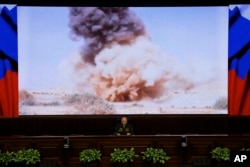The NATO alliance will likely decide to start conducting counter-Islamic State training inside Iraq during the NATO summit in Warsaw, according to a senior NATO official and a senior U.S. official close to the talks.
“That decision will likely be taken tomorrow … and I predict will be agreed,” the NATO official said on the condition of anonymity.
The official said the move inside Iraq would allow NATO to “scale up” the training, both in terms of the number of tasks offered to Iraqis and number of Iraqis trained.
Pushing for bigger NATO role
If approved by leaders Saturday, the move would come as the United States is pushing for the NATO alliance to become a coalition member in the fight against Islamic State in Iraq and Syria, according to senior defense officials.
Speaking to reporters ahead of the meeting, a senior U.S. defense official said Americans at the summit would like to see NATO serve as a “military contributor” to the campaign.
NATO is not fighting Islamic State forces as a bloc; instead, members have chosen to unilaterally contribute troops to the U.S.-led coalition in the region.
“I think the idea of NATO being a member of a coalition is something we in the United States think is very important, given the number of threats we see now and projected out into the future,” the defense official said.
NATO “doesn’t need to lead” the military campaign to be a contributor, the official added.
But becoming a coalition member does not appear to be of such great importance to the alliance.
“We’re not, frankly, hung up on the title," a NATO official said. “We’re much more interested in the substance of contributing in meaningful ways.”
Upsetting Russia
Critics warn deeper NATO involvement in the campaign could upset Russia, who is targeting Islamic State forces in Syria.
Tensions between NATO and Russia have been growing because of the alliance's build-up in the three Baltic countries and Poland. While NATO has labeled the build-up “assurance measures,” the Kremlin says NATO is acting as an aggressor by moving its borders ever closer onto former Soviet territory. A bigger NATO presence in Syria and Iraq could further inflame tensions by bolstering Russia's perspective of NATO as acting aggressively.
Though officials say Russian cooperation, especially in Syria, is critical, Daniel Serwer of the Johns Hopkins School of Advanced International Studies has warned of a new role for NATO in the region.
“We need Russian cooperation — in Syria, especially — and you’re not going to get Russian cooperation if NATO is there,” Serwer told VOA in an earlier interview.
U.S. officials have acknowledged that some NATO allies are concerned about the possibility that increased involvement in the counter-IS campaign could ignite another NATO-Russia confrontation elsewhere.
But a U.S. defense official said that logic runs counter to Russia’s talking points about deploying to Syria to target terrorists.
“If you're to believe the Russian concerns, then they should be happy with as many resources as possible aimed at the ISIL threat,” she said.
Russian President Vladmir Putin agreed to a meeting of the NATO-Russia Council next week, the second meeting this year of a consultation body that was put on ice after Moscow's seizure of Crimea in 2014.
In addition to a NATO training mission in Iraq, American defense officials are expecting NATO to set up an airborne early warning control system, also call AWACS, over Syria and Iraq.
The system could detect aircraft and vehicles from long range and help with command and control of anti-IS troops engaged in battle.
U.S. Secretary of Defense Ash Carter is hosting a counter-IS defense ministerial meeting in Washington on July 20, followed by a foreign ministerial meeting led by Secretary John Kerry on July 21 to follow up on progress made by NATO.





